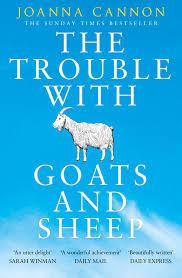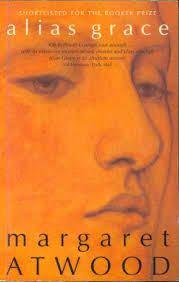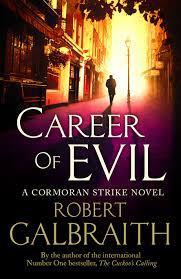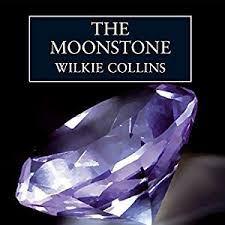Anyhow, having made this point, I now approach my thoughts on a few of the books I’ve listened to so far this year with trepidation, as I had mixed feelings about them.
I bought
Career of Evil by Robert Galbraith (well, J.K. Rowling) because it was one of the Xmas special offers on audible for 99p. I so nearly abandoned it halfway through the 15-hour slog. Now, what is it about this crime series that makes me feel so frustrated with J.K.? I suppose I feel she is an author with prodigious talents but a poor sense of what she can do with them. Essentially, I wish she would give up her fascination with all that is sordid and horrifying; I just don’t think she writes about it very well. Cherry-picking evil traits from myth and legend worked well for her monsters in Harry Potter. But in this novel, cherry-picking perversions from the catalog of human evil makes for an incoherent psychopath. And we get an awful lot of chapters from his perspective, as he plots his crimes and thinks repulsively misogynistic thoughts and thrills over his murder trophies in the fridge (you don’t want to know). I didn’t feel these chapters added to my understanding of why a person should become a serial killer, or to my anticipation of the plot. I figured out he was a bad guy and I shouldn’t feel much sympathy for him when he sent a severed leg through the post in the opening pages. Instead they were just unpleasant interludes that I was forced to listen to because nothing screams leap in the dark like fast forwarding on my ipod nano. No, what kept me reading was the relationship between J.K.’s detective, Cormoran Strike, and his assistant, Robyn. That’s properly engaging and delightful and worth the 99p even if it isn’t sensational and dramatic. Sorry, J.K.

The other book I had decidedly mixed feelings about – or should say ‘have’ as I’ve only got about four chapters in and am in a state of suspended uncertainty over continuing – is
The Trouble with Goats and Sheep by Joanna Cannon. Again it was an audible special deal and I’d heard a lot of good things about it, notably that it was hilariously funny. In this instance I don’t blame Joanna Cannon as the fault is mine for not reading the blurb more carefully. I will come clean: I have a problem with precocious child narrators. I find them implausible the way I find the present tense implausible. The present tense can only ever be a fantasy of immediacy; no story can ever be written in the moment of its unfolding. And precocious child narrators are only ever a nostalgic fantasy on the author’s part for what childhood is like. Children can be very funny and perceptive, but only once in a blue moon, not in any sort of sustained way; most of the time they don’t understand the majority of what’s going on around them because that’s what growing up is for. Also, this novel is set in the 70s (much mention of Angel Delight) and our narrator and her little friend are visiting the neighbours hoping to glean clues about the disappearance of one of them. Now I was a child in the 70s and remember clearly that it was an era before human rights were extended to children. If I had turned up on a neighbour’s doorstep, I would have been kindly but firmly sent home. No neighbor would have dreamt of inviting me in and hosting me with snacks and information. But maybe I could overcome these quibbles and get into this novel. Has anyone read it? Should I give it another go?

Let’s turn to the great successes. I listened to Margaret Atwood’s
Alias Grace, a novel which I read many, many years ago and remembered loving, though happily I remembered little else about it. This was sheer class. It’s the story (taken from historical record) of servant girl, Grace Marks, who is imprisoned for life for her part in the brutal killings of her employer and his housekeeper. There was, however, much doubt and uncertainty about Grace’s actions as she claimed to have lost her memory of the crucial events. In Atwood’s novel, the ambitious doctor, Simon Jordan, turns up at the prison to make a study of Grace, hoping the fledgling tactics of psychoanalysis will help him get at the truth. Atwood has a lot of fun with the pretensions of male doctors and do-gooders alongside a complex, moving portrait of the young servant girl. I loved this novel. Just fantastic.
A more surprise hit has been
The Moonstone by Wilkie Collins. Wilkie and I have fallen out in the past over his verbosity. Why say something in a sentence when you could take a good ten pages over it? Well, I was braced for more of the same, but somehow something feels different about this novel. Maybe it’s partly due to the excellent narrating skills of Peter Jeffrey who is making it very compelling listening. But it also feels well-paced with enough incident and suspense to be truly gripping. It’s the story of an ancient Indian diamond, stolen in the confusion of war and brought back to England as a young woman’s inheritance. It has the superstition attached to it of causing trouble, and when it is stolen the same night she receives it, the crime throws her harmonious family into discord and disarray. Enter a delightfully lugubrious policeman, Inspector Cuff, lovesick servants with troubled pasts, thwarted lovers, ambitious politicians and the amusingly dreadful Miss Clack, whose determination to sow the seeds of Christian thought have made her capable of rising above all insult. It’s a treat.
Well I have written over a thousand words and I’ve barely scraped the surface of the past three months’ reading. Clearly, there will have to be a part 2 involving Willa Cather, Elizabeth Strout’s My Name is Lucy Barton, Meg Rosoff’s Jonathan Unleashed, Malcolm Gladwell, Hannah Rothschild and more. I will be back.
Advertisements




